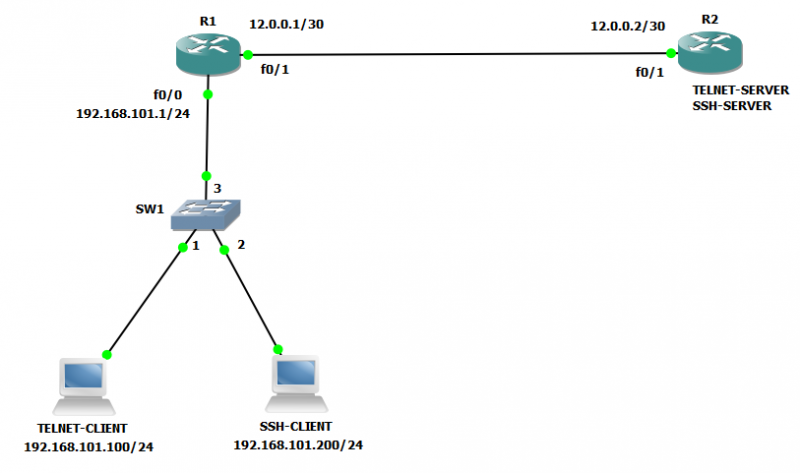- Total 2 Answers
- 17275
Time Based Access Control List:
Time based ACL are just like normal Extended ACL but in this we define time-range which defines duration for which ACL is going to work.
To configure these ACL we need to configure Time-Range and define time in that Time-Range.
Time range are of two types
• Absolute time-Range
• Periodic Time-Range
Absolute Time-Range: In this duration of time is fixed throughout the time-range defined.
Periodic Time-Range: In this duration is periodic and can be set according to the requirement in our time range.
Note: Time of all the device should be synchronized
Configuration:
According to our topology, we have telnet and ssh client which are going to access telnet and ssh server, we are going to restrict each client to not to be able to perform other service using time-based ACL
Please follow topology for reference.

In global configuration mode we created two time range named CISCO and ABCD by following configuration:
R1(config)#time-range CISCO
R1(config-time-range)#absolute start 11:30 10 april 2017 end 11:35 10 april 2017
R1(config-time-range)#exit
R1(config)#time-range ABCD
R1(config-time-range)#periodic weekdays 11:30 to 11:35
R1(config-time-range)#exit
Now we are going to call these Time-Range in Extended ACL
by following commands for restricting traffic of each client:
R1(config)#ip access-list extended TELNET/SSH
R1(config-ext-nacl)#deny tcp host 192.168.101.200 host 12.0.0.2 eq 23 time-range CISCO
R1(config-ext-nacl)#deny tcp host 192.168.101.100 host 12.0.0.2 eq 22 time-range ABCD
R1(config-ext-nacl)#permit ip any any
R1(config-ext-nacl)#exit
Now we apply ACL on interface for restricting traffic to go past R1
and reach Telnet/SSH server.
R1(config)#int f0/0
R1(config-if)#ip access-group TELNET/SSH in
- How can you guarantee a job for students who has no experience in Networking field?
- How to configure VPN between Cisco Router and ASA Firewall?
- How to configure RIPV2 with no auto summary?
- How to configure PAT (Port Address Translation)?
- How to configure Default Routing on Cisco Routers?
- What is the scope of CCNA course in India?
- What is scope of CCIE?
- How to remember 7 layers of OSI Model?
- How much salary can we get after doing CCNA course in Delhi Gurgaon?
- How many CCIE’s are there worldwide?
- Is it possible to pass CCIE Certification in 1st attempt?





